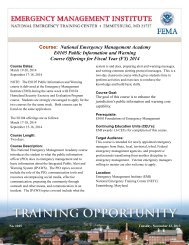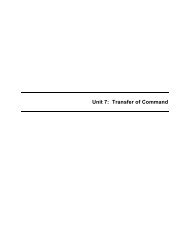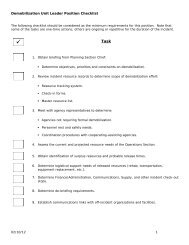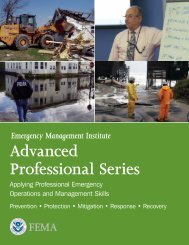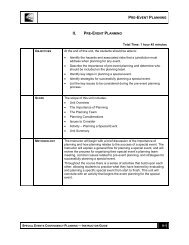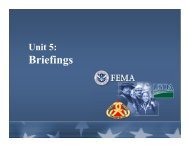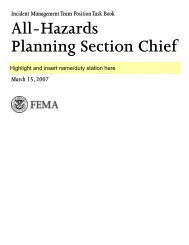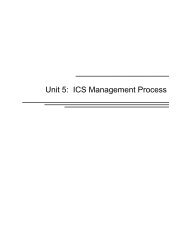enrollment for emi courses - Emergency Management Institute ...
enrollment for emi courses - Emergency Management Institute ...
enrollment for emi courses - Emergency Management Institute ...
Create successful ePaper yourself
Turn your PDF publications into a flip-book with our unique Google optimized e-Paper software.
EmE r g gE E n nc cy y ma n na a g gE E m mE E n nt t In Ins st tI tI t u ut tE E • 2010-2011 • ca cat ta al l o g of co u r rs sE Es s<br />
Selection Criteria: Full-time, executive-level, Federal,<br />
State, Tribal, or local <strong>Emergency</strong> Managers with<br />
experience in disasters or those holding major<br />
policy-making positions related to emergency<br />
management. This is a course designed <strong>for</strong> the highest<br />
echelon of emergency management with experience<br />
in responding to and recovering from catastrophic<br />
events. The Federal, State, and local participants must<br />
have emergency management experience at the<br />
highest level of operation <strong>for</strong> their community, such<br />
as <strong>Emergency</strong> <strong>Management</strong> Director, <strong>Emergency</strong><br />
<strong>Management</strong> Section Chief, etc., or Executive Officer<br />
or President or equivalent positions in organizations<br />
that support <strong>Emergency</strong> <strong>Management</strong> functions, such<br />
as the National <strong>Emergency</strong> <strong>Management</strong> Association<br />
(NEMA); the International Association of <strong>Emergency</strong><br />
Managers (IAEM); the Association of State Floodplain<br />
Managers (ASFPM); the International Association of<br />
Fire Chiefs (IAFC); the International Association of<br />
Chiefs of Police (IACP); the American Public Works<br />
Association (APWA); etc., or Directors of <strong>Emergency</strong><br />
<strong>Management</strong> Programs at the Federal, State, or local<br />
level, such as State emergency management directors,<br />
FEMA directors, etc., or key leading positions in<br />
other organizations.<br />
NOTE: This is a competitive program. In order to gain full credit,<br />
it is recommended that in addition to the FEMA 75-5, General<br />
Application Form, applicants also submit a brief (no more than one<br />
page) summary of their work experience and why they feel they<br />
should be in this program.<br />
“Key Leading” Selection Criteria: The Executive <strong>Emergency</strong><br />
<strong>Management</strong> Symposium is EMI’s pr<strong>emi</strong>er executive<br />
education program with a limited capacity of<br />
participants each year. The primary audience is<br />
executive-level officers; however, a limited number<br />
of non-executive-level applicants who have<br />
demonstrated the ability to exercise leadership will<br />
be considered <strong>for</strong> the Executive <strong>Emergency</strong> <strong>Management</strong><br />
Symposium within an audience category known as<br />
“Key Leading.” Once the minimum acad<strong>emi</strong>c<br />
requirement has been demonstrated, candidates will<br />
be selected on the following criteria:<br />
51<br />
NOTE: It is not required that a candidate possess all of the<br />
following; however, the more achievements and criteria presented,<br />
the stronger a candidate’s application will be considered.<br />
• Those applicants requesting consideration <strong>for</strong><br />
a key leader slot must possess the minimum<br />
acad<strong>emi</strong>c requirement of an Associate’s degree<br />
from a regionally accredited college or university.<br />
• Advanced acad<strong>emi</strong>c degrees will further<br />
strengthen the candidacy of the applicant.<br />
• Unique perspectives that broaden the diversity of<br />
the Executive <strong>Emergency</strong> <strong>Management</strong> Symposium.<br />
• Personal accomplishments and significant<br />
contributions to emergency services and/or the<br />
community.<br />
• Potential <strong>for</strong> future impact on emergency services.<br />
It is expected that the applications <strong>for</strong> these limited<br />
numbers of positions will be very competitive in<br />
nature. Applicants are encouraged to carefully<br />
review all of the a<strong>for</strong>ementioned and following<br />
selection/application elements be<strong>for</strong>e submitting<br />
their application package.<br />
Prerequisites:<br />
Required: IS 100.a, Introduction to the Incident Command<br />
System (ICS), ICS-100; IS 200.a, Incident Command System<br />
(ICS) <strong>for</strong> Single Resources and Initial Action Incidents, ICS-<br />
200; IS 700.a, National Incident <strong>Management</strong> System<br />
(NIMS), An Introduction; IS 800.b, National Response<br />
Framework (NRF), An Introduction; and an Associate’s degree.<br />
Recommended: Bachelor’s or higher degree.<br />
Course Length: 4 days<br />
FEd E r A L Em E r g E N C y mA N A g E m E N T Ag E N C y<br />
rEsIDEnt cOursEs—<br />
prOfEssIOnal<br />
DEvElOpmEnt



